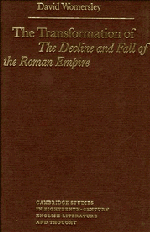Book contents
- Frontmatter
- Contents
- Acknowledgements
- A note on references and quotations
- Introduction
- PART I The historiography milieu
- PART II The Decline and Fall of the Roman Empire
- 3 Introduction
- Volume 1 - 1776
- Gibbon among the philosophers
- Volumes II and III - 1781
- Volumes IV, V and VI - 1788
- 13 ‘A dead uniformity of abject vices’
- 14 Structure
- 15 ‘Not a system, but a series’
- 16 ‘A keener glance’
- 17 Realising the past
- 18 ‘The wide and various prospect of desolation’
- Appendix
- Bibliography
- Index
15 - ‘Not a system, but a series’
Published online by Cambridge University Press: 05 September 2013
- Frontmatter
- Contents
- Acknowledgements
- A note on references and quotations
- Introduction
- PART I The historiography milieu
- PART II The Decline and Fall of the Roman Empire
- 3 Introduction
- Volume 1 - 1776
- Gibbon among the philosophers
- Volumes II and III - 1781
- Volumes IV, V and VI - 1788
- 13 ‘A dead uniformity of abject vices’
- 14 Structure
- 15 ‘Not a system, but a series’
- 16 ‘A keener glance’
- 17 Realising the past
- 18 ‘The wide and various prospect of desolation’
- Appendix
- Bibliography
- Index
Summary
… the toil with which performance struggles after idea.
JohnsonThe antipathy of philosophic historiography to the mere sequence of past events is clear in its devotion to the systematic, not the serial; in its aspiration to transcend the superficies of historical knowledge and comprehend the causes which informed the past, and the study of which gives purpose and value to history. Voltaire is explicit:
Si vous n'avez autre chose à nous dire, sinon qu'un Barbare a succédé à un autre Barbare sur les bords de l'Oxus & de l'laxarte, en quoi êtes-vous utile au public?
This was in part a reaction against the more automatic kinds of annalistic historiography (of which large tracts of the Universal History could be cited as examples), in which the primary ambition of the historian was simply to record and in which there was consequently no attempt made to bring out, by means of narrative emphasis, the essential or significant. But, beneath that jousting engagement with previous historians, we can also see that the fact of historical sequence runs counter not only to the ambitions of a philosophic historian, but also to his assumptions. It challenges his premise that history is essentially homogeneous. Thus, as we saw in the case of Hume, the philosophic depreciation of sequence has an embarrassing obverse. If one accepts the philosophic postulate that history is at bottom uniform, then sequence is simply the deceptive surface of the past.
- Type
- Chapter
- Information
- The Transformation of The Decline and Fall of the Roman Empire , pp. 228 - 241Publisher: Cambridge University PressPrint publication year: 1988



